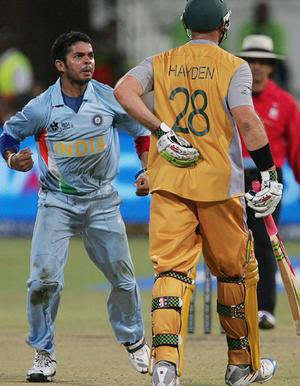 Sreesanth and Hayden, cricket's bad boys
Sreesanth and Hayden, cricket's bad boysThe dust had barely settled on Monkeygate, before another (two, if you include the spat between Ishant Sharma and Andrew Symonds) potential row has threatened to disrupt what has been one of the more evenly contested cricket series in recent memory.
Looking at the controversy, there are two indisputable facts. One, that no team sledges more (and you have to admit, more effectively too) than the Australians. It is equally true that Indians have been reported more times (and not just in
Depending on your nationality, one can take a stand on Harbhajan Singh politely inquiring about Mrs. Symonds’ private parts (I honestly think there is something seriously wrong with the game if that is more acceptable than a cricketer calling a fellow player a monkey).
Or you can get morally uppity about Matt Hayden calling Harbhajan “a poisonous weed”, which considering it wasn’t said in the heat of battle was perhaps not the nicest of things to say.
So, do Australians sledge? Or, are Indians regularly reported on issues of misconduct? The truth might lie, as it often does, somewhere between those two doggedly, even adamantly, held positions.
Gavaskar is being a bit naïve when he says he wants to get sledging banned from international cricket. It isn’t as if sledging thrives because it is a part of some official ICC statute. Repeat offenders like Andrew Symonds and Harbhajan Singh, or for that matter, Mathew Hayden aren’t exactly choirboys waiting for an official ICC ban on sledging to zip their mouths.
Most cricketers who have played international cricket would tell you that there are essentially two kinds of sledging. One happens when the contests run close, as they have in the ongoing series between
It has been known when players discuss strategies in team meetings, names of some players come up who are perceived to be vulnerable to sledging. You give the batsman a verbal work over, and see if he gets distracted enough to give the bowlers a chance. Similarly, you engage a bowler in a verbal spat, and see if you can throw him off his line and length.
That sort of sledging, though part of no ICC code, is acceptable among most cricketers.
The part that is unacceptable is when someone like Hayden shoots his mouth off in a radio show, knowing fully well his words will be repeated, even lapped up by both Indian and Australian media. Once players use the media to take pot shots at each other, there is no telling how far it can go, or how ugly it can get.
Even the Australians know better than to sledge against an old pro like Tendulkar. He is not known to give it back verbally, but uses his broad bat to cause considerable damage. Shane Warne, who always had a thing or two to say from his position in the slips, has admitted on more than one occasion there was simply no percentage in sledging against Tendulkar. “There would be no discernible reaction from the maestro, he would just take it out on the bowling,” observed Warne.
While some players like Tendulkar are impervious to sledging, others like former
As part of that concept, every time a visiting side arrived in
Post-retirement, writing in his autobiography, Waugh lavished praise on Ganguly as “a tough cricketer and a tougher captain”. The praise was hard-earned. Ganguly first captained an Indian side that scripted a memorable Test victory at
Two years later in
Australians have learnt the hard way the pointlessness of riling players like Tendulkar or Ganguly.
Contemporary cricket is both physically gruelling and mentally tough, a far cry from the gentleman’s game played by the likes of WG Grace. The game is played harder, both on and off the ground. There is no point getting squeamish about sledging.
Mahendra Singh Dhoni, the Indian one-day captain, has put the issue in right perspective when he said sledging is an art, and that the Australians have turned sledging into an art form and Indians have some catching up to do in this regard.
Dhoni’s statement has just the right blend of caution, common sense and aggression – like his best one-day knocks. You can take it at face value and say Dhoni was complimenting, albeit backhandedly, the Australians for their sledging skills. Or you can read in his straight faced response an implied threat – that Indians plan to sledge just as good and as hard in the coming days.
.






